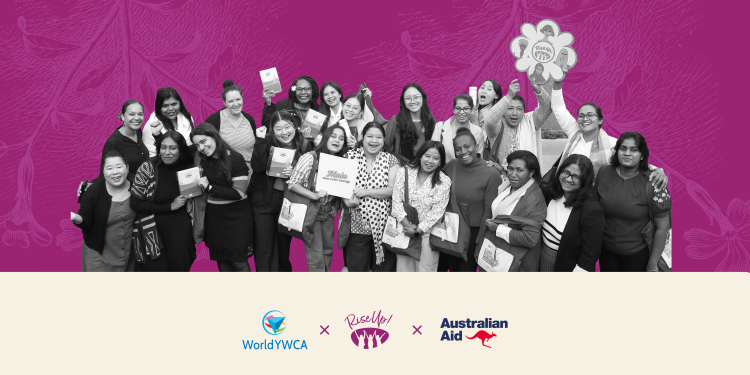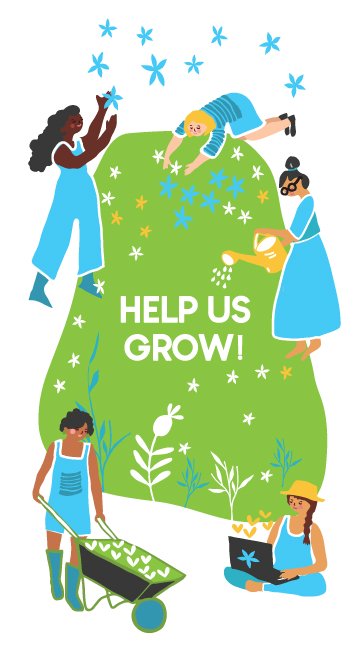What does it take to be a hub of innovation, from local communities to the global stage? It takes more than just a single program or a workshop. It requires a fundamental power shift — a commitment to supporting young women to lead, not just in the future, but right now.
World YWCA’s RiseUp! Young Women’s Leadership and Advocacy Initiative in Asia and the Pacific is implemented in 8 countries, proudly supported by the Australian Government Department of Foreign Affairs and Trade (DFAT). For those new to this work, RiseUp! Asia Pacific is a flagship leadership initiative that not only equips young women with the tools, resources, and platforms to tackle the most critical issues in their communities but also is a hub of innovation that has global impacts.
We are in a time of global pushback on gender equality and women’s rights, where not one country is on track to achieve gender equality by 2030, and nearly 40% of countries have stagnated – or even declined – in their progress towards gender equality goals. Already, scant resources for gender equality have been reduced further, with national budgets redirected to infrastructure and defence/security as conflicts and climate disasters increase. Democratic processes have eroded in many nations, and there has been a rise in anti-women’s and girls’ rights agendas and policies.[1]
Young women’s and girls’ leadership, power, and voices are the number one strategy to advance gender equality in poly-crisis
Here’s how we put that strategy into action over the past year in countries implementing RiseUp! in Asia and the Pacific: from March 2024 through February 2025, RiseUp! Asia Pacific reached 2,092 young women, teamed up with 53 communities to spark real change, and kicked off 14 local advocacy campaigns. RiseUp! Asia Pacific engages the hardest to reach, working with diverse indigenous and ethnic groups, young women facing religious and caste discrimination, and deaf young women.
Beyond the numbers are the energy, partnerships, new thinking, and new offerings to the world
RiseUp! Asia Pacific is not only a safe space for young women to lead and advocate, but also to co-design World YWCA Signature Tools, conduct research into the issues that matter to them, and pilot approaches that enable them to be funded directly to make change in their communities. Our key achievements in the past year have ranged from micro-grants in the Pacific to Disability inclusion to climate justice. We have explored what works in intergenerational leadership and outcomes of transformative leadership for young women and their communities. Don’t just take our word for it – here are the voices of young women who have been part of RiseUp! in the past year!
It Starts with Safe Spaces and Shared Power
At the heart of RiseUp! Asia Pacific is the knowledge of the YWCA movement’s history that leadership begins in safe, intergenerational spaces where young women can build confidence and solidarity. We go beyond the false binary of young women (under 30) and older women (over 30) to an approach of multiple generations learning, growing, and creating change together. Through RiseUp! Asia Pacific, the World YWCA’s Intergenerational Triangle: A Guide to Shared Leadership was born – a practical guide for movements, organisations, networks, and alliances everywhere.
In February, RiseUp! Asia Pacific came together to learn, celebrate, and innovate. World YWCA’s General Secretary/CEO, Casey Harden, and representatives from the Australian government met with young women leading RiseUp! Asia Pacific in their countries, showcasing young women’s leadership as Bold, Transformative, Unstoppable.
Karen, a RiseUp! Young Woman Lead from YWCA Myanmar found the experience powerful, challenging, and deeply inspiring. “The session on Feminist Consultation Methodology reminded me that change begins with inclusive, intentional, and community-centred approaches. The conversation on feminist funding and microfunding was a wake-up call. We talk about justice and equality, but without financial resources reaching grassroots movements and marginalised groups, the fight remains uneven. But what truly touched me was the Peace, Conflict, and Justice session. It wasn’t just theory, it was raw and real. It brought home the struggles for safety, truth, healing, and justice in a way that made me pause and reflect.”
The Power of Leadership and Advocacy in Action
World YWCA’s RiseUp! Guide for Young Women’s Transformative Leadership is designed to ensure that the threads of leadership – values, knowledge, and skills – learned in a workshop don’t stay there. Young women design and lead their campaigns, tackling the priority issues they have identified in their communities, including sexual and reproductive health, gender based violence, early and forced marriage, mental health, and political and civic engagement. RiseUp! Asia Pacific is seeing a shift in local young women towards more progressive, gender-equitable attitudes and behaviours, and is catalysing a layered transformation across the social ecosystem surrounding young women.
In Papua New Guinea, RiseUp! took the form of an innovative micro-funding pilot, with young women receiving funds to create change in their communities.
MaryAngela, a 30-year-old nurse midwife, used a small grant to host workshops on the taboo topic of sexual and reproductive health. The result was a groundbreaking shift in her community, as her work “drew unprecedented community support — even from elders who had never before backed such initiatives”. In Nepal, young women are challenging deep-seated cultural norms by leading intergenerational dialogues with faith leaders to dismantle the stigma around menstruation. This is what happens when resources and trust are placed directly in the hands of local leaders.
When everyone is included, real change happens
Disability inclusion is more than making a seat at the table; it is ensuring everyone’s unique perspectives, challenges, and solutions are considered and on the agenda. Through RiseUp! Asia Pacific, the YWCA of India works with deaf communities, engaging deaf researchers through the World YWCA’s Feminist Consultation Methodology (FCM), and adapting the RiseUp! Guide for Transformative Leadership into Indian Sign Language.
Kanika participated as a deaf co-researcher in comprehensive sexuality education for the deaf community. She found the experience of conducting research within the deaf community both “challenging but interesting”. According to Kanika “Most deaf adults – especially women – seemed baffled by the questions in the research form, their knowledge still lags in many areas related to SRHR.” Despite these challenges, Kanika noted a positive aspect: “The women did not shy away from the questions. They were eager to understand them and answer the research questionnaire openly.”
For Muskan, the research experience revealed a significant knowledge gap in the deaf community regarding sex education. “It became clear and evident that deaf individuals lack proper sex education advice or support from their parents and teachers, mainly due to the lack of communication and access to information in sign language,” she shared. Muskan emphasized the gravity of this gap: “The absence of comprehensive sex education leaves deaf individuals vulnerable to misinformation and health risks. This inequity impacts their physical health, well-being, and empowerment.” Her personal experience sparked a deep commitment to advocating for better, more accessible Comprehensive Sexuality Education (CSE) for the deaf: “Deaf people deserve the same important sexual and reproductive health information as anyone else.”
From Local Truths to Global Stages
Young women led research across India and the Pacific using World YWCA’s FCM, bringing the voices they heard to regional and global stages.
The Pacific Mediators Network and Transcend Oceania worked with seven young women using FCM to conduct focus groups in Tonga, Fiji, and Bougainville. They contributed their findings and recommendations to a women-led mediation case study submitted to the Pacific Islands Forum and the UN Security Council Open Debate on Women, Peace and Security. One co-researcher from Tonga shared, “I am immensely grateful for this opportunity… to delve deeper into the current issues of Peace and Security affecting women and young women across our Pacific Islands.” Another from Fiji echoed the sentiment, emphasising the journey of growth, learning new skills, and contributing to something bigger than oneself.
Politics4Her Asia created a global online campaign, Whispers for Dignity, after conducting research using FCM in Lesbian, Bisexual, Transgender and Intersex ( LBTI) communities in India. Their findings and recommendations include the voices of young participants, including one who shared, “In rural areas I haven’t seen or heard anything related to LBTI rights or sexual health. Even our health workers don’t talk about these topics, and we don’t know where to find the right information”. Another shared their experience with healthcare providers is that they often do not offer gender-affirming care, leading to distrust and a reluctance to seek help. “Doctors don’t take us seriously. They ask inappropriate questions, and sometimes don’t even understand what we’re asking for.”
The final piece of the RiseUp! strategy is to ensure that these grassroots voices echo in the halls where decisions are made by intentionally opening doors to young women who are part of RiseUp! Asia Pacific to join global forums—so their local experiences shape global policy.
This journey is perfectly captured by Arrapan, a Young Woman Lead from Thailand who attended the Association for Women’s Rights in Development’s (AWID) Forum in December 2024. Though initially shy, worried about her English and how to connect with people, everything shifted once she got there. “I became more confident and found my voice as the event went on,” she shared. “This connection made me realise that we are part of a larger movement, and it encouraged me to keep fighting for women’s rights”.
The Unstoppable Effect
From Zoya’s safe space in India to Arrapan’s global stage in Thailand, the RiseUp! effect is clear. It’s a model that proves when you invest in young women’s leadership, the impact is not just personal — it is social, political and unstoppable. Over the next year and a half, RiseUp! Asia Pacific will continue to grow from strength to strength. New RiseUp! Leadership and Advocacy Modules, taking a deeper look at Peace, Conflict, and Justice and Sexual and Reproductive Health and Rights, will be launched; an independent learning evaluation will be led by young women using the FCM; and young women’s voices will be heard on more global stages. Together, we rise up!
Explore the Tools for Change
The work you’ve just read about is powered by a set of signature guides designed to be adapted and used by young women leaders everywhere.
- The RiseUp! Guide for Young Women’s Transformative Leadership: The core curriculum covers everything from feminist values and human rights to practical advocacy skills. Access the Guide Here>
- The Feminist Consultation Methodology: A powerful research tool that places evidence-gathering power into the hands of young women, ensuring research is led by and for the communities it affects. Access the Guide Here>
- The Intergenerational Triangle: A Guide to Shared Leadership: A practical model for breaking down age-based hierarchies and fostering inclusive leadership through mutual learning and the redistribution of power across generations. Access the Guide Here>
- Safe Spaces Guide: The foundational approach to ensuring every workshop, meeting, and dialogue is grounded in safety, protection, accountability, and trust. Access the Guide Here >






